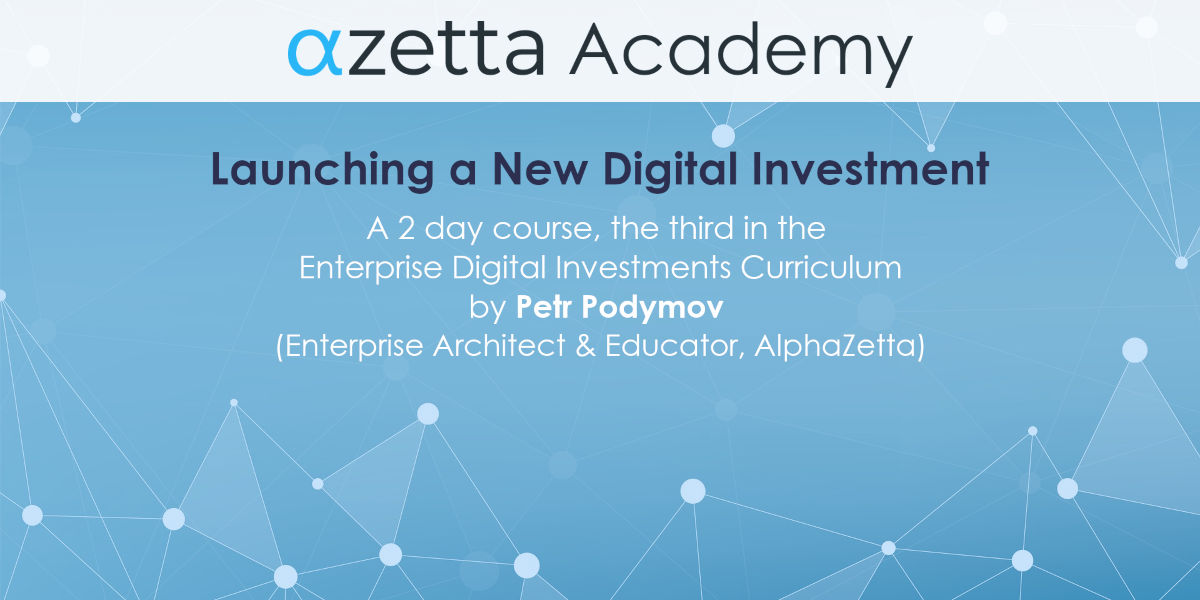The Launching a New Digital Investment course gives you the knowledge and tools to justify your digital investment, compare real costs, understand the required resources and finally launch your project, program or product.
Once you’ve completed your enterprise analysis and feasibility study, and you know well what improvements to make in your organization, your journey towards implementation is just beginning.
If your transformation initiative is to have a substantial effect, it probably requires extra budget and needs a high priority within the change portfolio, which means the next level of evaluation and decision-making.
Next you need the go ahead for launching your new digital investment and you must prove your team’s ability to implement it. The course equips you do that by showing you how to:
- Justify your digital investment by fitting it to the business’ values and stakeholders’ requirements
- Gather and compare implementation proposals and present a selection for final approval
In doing so, you will compare real costs, understand the resources necessary, and finally you will launch your new digital investment as a new project, program or product. Execution management is another story.
This course completes the path of the Enterprise Digital Investments Curriculum.
Day 1: Digital solutions justification
1. Business case and value drivers
- Why business case is important for each initiative
- Generic process for business case creation
- Typical value drivers hierarchy to align with
- Finance discipline and flexibility balance
- Select drivers for your initiative
- Sample presentation structure for decision support
2. Business and IT stakeholder management
- Evolution of business & IT governance
- Stakeholder map: identification and classification
- Stakeholders to authorise (and help with) technology decisions: CTO, DPO, EA, etc.
- Influencing stakeholders’ willingness to help
3. How to explain digital solution values to a given audience
- Information needed to prepare such an explanation (metrics) and sources of data
- Practice on recognised digital solutions, explaining their values to non-IT audience
- Technology adoption lifecycle and initiative placement
- Connect solution values with stakeholders’ values (not always KPIs)
4. Interactive teamwork on selected topics (take one per team):
- Online & omnichannel
- Performance management
- Accounting & reporting
- Micro-service landscape
- Digital ecosystem
- Integrated front-end
- Corporate communications and collaboration
and more
Day 2: Technology evaluation and approval
1. Project and epic selection
- The dimensions of project selection
- Project classification: regulatory, business, strategic, etc.
- Epic and enabler – complementary entities
- Information you need to put your digital initiative on the map
2. Revenues and expense structure
- Economics vs. finance
- ROI and TCO calculation
- Count your project team
- Short-term vs. long-term – why discounting matters
- Find sources for common economical figures
- Fill-in sample financial model
3. Vendor & technology selection
- Technology selection maps
- Solution options show up – more than one is good
- Vendor risk management
- Compare qualitative and quantitative parameters
4. Project and investments risks that are typical for digital solutions
- Project risk vs. maintenance risk
- Risk components and technical debt
- Handling stakeholders’ questions (including role-play)
- Perform basic risk assessment
- Final exercise: Join and balance arguments together in one presentation (teamwork)
Additional Information – Launching a New Digital Investment
| Audience | Expert, Business, Management
This course aimed at companies with significant investments in enterprise technology or that are making efforts to improve change management. It is for managers and experts involved in digital transformation, project and product managers, team leads, solution and enterprise architects, mid-level line managers, external IT consultants. |
| Prerequisites | Participants should have experience in project/product/team management and in working with enterprise technology within an organisation. Ideally they have also completed course 1 and course 2 from this curriculum. |
| Objective | Learn by practicing how to perform technology selection and get stakeholders’ approval to launch a new digital investment:- Select business value drivers for a digital initiative
- Select vendor and technology
- Gather stakeholder’s attention and obtain support
- Fairly explain benefits and risks of digital solutions addressing target audience.
|
| Format | Class |
| Duration | 2 days in-person, 4 part-days online |
| Course Author | Petr Podymov |
| Trainer | Courses are taught by Petr Podymov and/or his hand-picked team of highly skilled instructors. |
| Delivery Method | Online, in-person at AlphaZetta Academy locations or on-premise for corporate groups |
Our online courses run as live online meetings using Zoom for the video meeting part and Microsoft virtual computers for the practical components. The benefit of having a live trainer for online training is you can ask questions, obtain mentoring from the trainer and interact with classmates.
Course participants will require the following technologies and online accounts. Please check that your setup satisfies these requirements:
- Course participants will require the following technologies and online accounts:
- Reliable computer (Windows, Mac or Linux)
- Webcam (to help facilitate the mentoring aspect of our training)
- Reliable internet access
- A quiet space
- Zoom video conferencing software and Zoom account (register and pre-install the software at zoom.us)
- Microsoft account in order to access the virtual lab PCs (Existing or new account. There’s nothing to be installed, you just need an account to sign-in with.)
Meals and refreshments
Face-to-face courses: Catered morning tea and lunch are provided on both days of the course. Please notify us at least a week ahead if you have any special dietary requirements.
Feedback
Use academy@alphazetta.ai to email us any questions about the course, including requests for more detail, or for specific content you would like to see covered, or queries regarding prerequisites and suitability.
If you would like to attend but for any reason cannot, please also let us know.
Variation
Course material may vary from advertised due to demands and learning pace of attendees. Additional material may be presented, along with or in place of advertised.
Cancellations and refunds
You can get a full refund if you cancel 14 days or more before the course starts. No refunds will be issued for cancellations made less than 14 days before the course starts.
Frequently asked questions (FAQ)
Do I need to bring my own computer?
This is dependent on the venue. Please check the course event page.
Why do I need to provide a shipping address?
For online courses, we need an address to send you the course notes that you need for the course.
Discounts
Face to face public courses: early bird pricing is available until 2 weeks prior. Group discounts: 5% for 2–4 people, 10% for 5–6 people, 15% for 7–8 people, and 20% for 9 or more people. Discounts are calculated during checkout.
Online public courses: available at a 25% off the face-to-face courses as a special introductory price. to groups or to individuals who want to follow a curriculum program and attend multiple courses:
- 2-4 courses/attendees 10% off
- 5+ courses/attendees 20% off
Hurry as bookings will close 1 week before each course. Group discounts are calculated during checkout on individual courses. Individuals can book multiple courses at a discount – please enquire.
Course Booking Terms and Conditions
Private and Corporate Training
In addition to our public seminars, workshops and courses, AlphaZetta Academy can provide this training for your organisation in a private setting at your location or ours, or online. Please enquire to discuss your needs.

Based in Russia
Petr is a seasoned Enterprise Architect with a focus on planning, explaining and justifying structural investments in business and technology change and transformation programs. He has more than 15 years’ experience in banking, retail and education industries. Since 2011 he has focussed on digitally oriented organisational transformations, having worked his way through business process management to become a project portfolio leader, then a management consultant and CIO.
Petr has played an expert role in several huge-scale PMO establishment initiatives. Once demand for agile-transformation appeared, he participated in advanced governance model creation with enterprise agility pioneers of their industry: Sberbank of Russia and Leroy Merlin. Petr is also a university lecturer in magistracy and new course author since 2015 and develops education programs for professional audiences.



